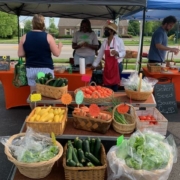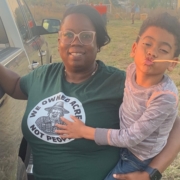LaTrael Brigham
LaTrael Brigham gained farming experience both as a child and a young adult. He started farming by working in his grandma’s garden and then, as a teenager, working on a farm. He joined the military, where his interest in farming broadened, as he could see how agriculture is all around us. Witnessing the vineyards and animal husbandry internationally was a drive for him to incorporate farming into his personal life once he retired from the Army. LaTrael’s wife, Chisa, had a similar history, growing up watching her great grandmother grow food in her backyard. LaTrael and Chisa began a garden, not just because of their similar backgrounds in growing but also because they wanted better, healthier foods for their children (one in particular, who had a bad skin allergy). They began their journey growing believing that food is medicine and wanting to do what is healthiest for their family.
Chisa and LaTrael work on 1.7 acres of land in the middle of Waco, Texas. They grow vegetables, herbs, and fruit using a no-till method. They have participated in many beginning farmer workshops. Chisa joined the National Women in Agriculture Association and has completed a year of a beginner farmer program. She has also taken advantage of other training, such as NCAT’s Armed to Farm and a local virtual beginner farmer workshop offered by the Smithsonian. Their original method of growing was raised beds but have since switched to in-ground planting, as it saves money and time. They place an emphasis on not using chemicals on their food as a part of being intentional about growing the healthiest produce.
Chisa says that efficiency is one of their biggest challenges in farming, as they also have a family to care for. Chisa and LaTrael are parents to three children, and both work full-time jobs so making use of their time, money, and resources for their operation must all be managed properly for the best use. Education has also been an intricate part of their farming journey, as they started out with little knowledge. In seeking education, Chisa says that reaching out to local agencies for an on-site visit was a frustrating experience, because an appointment would be made but then nobody showed up. She also remarked that help from local government agencies like NRCS and USDA is not always accessible for farmers of color. Chisa and LaTrael have decided to make a sizeable investment in their farm and say that even for farmers who are able to financially invest, it is a good idea for an entity to match funding.
Chisa and LaTrael share that they wish they knew more about soil health and the role it plays in growing food and animals. They desire more land so that they can grow and provide more produce to their family and community. They took extra steps to care for their daughter by eliminating some food components that contribute to bad allergies. At the top of their list in understanding which direction to go in their operation is listening to their land. They connected with other individuals in the area through the LIFT (Leaders in Farming Technology) program, which provides courses, videos, and educational resources. Chisa says that connecting with other military families and with others on Facebook groups has been an effective way to learn and grow their own operation.
Chisa and LaTrael shared that the most impactful relationships through their farming career are those that have been established along the way, and the one between the two of them as husband and wife and business partners. Chisa also shared that the National Women in Agriculture Assocation has allowed them to gain a significant amount of knowledge in the last year through the LIFT project. LaTrael says that networks, agencies, and organizations can help farmers learn how to manage farms and finances early on. Chisa says that building and maintaining relationships is something that organizations should do more of to build trust and relationship amongst farmers and entities. Their wish is to begin an agrotourism operation and place emphasis on feeding their community, as they reside in a food desert. They both described their success as being able to accomplish their goals and dreams of getting their agrotourism business established and being able to grow productively.
Their greatest barrier to successful farming in their community is knowing how to properly farm as urban farmers. Their lack of urban farming knowledge has prevented them from doing things most rural farmers would not have an issue with, such as accessing water or setting up a farmers market. Despite their challenges and barriers, Chisa and LaTrael are happy with their journey thus far and are seeing great results in the health of their children and family as a whole.











